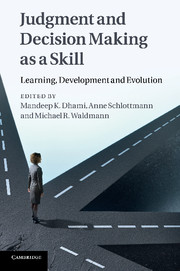Book contents
- Frontmatter
- Contents
- Figures
- Contributors
- Preface
- Acknowledgments
- Chapter cross-reference table
- Part I Evolutionary and neural bases of JDM
- 1 The evolved foundations of decision making
- 2 Neural bases of judgment and decision making
- Part II Developmental approaches to JDM
- Part III Learning JDM
- Part IV Improving and aiding JDM
- Conclusion
- Index
- References
1 - The evolved foundations of decision making
Published online by Cambridge University Press: 05 December 2011
- Frontmatter
- Contents
- Figures
- Contributors
- Preface
- Acknowledgments
- Chapter cross-reference table
- Part I Evolutionary and neural bases of JDM
- 1 The evolved foundations of decision making
- 2 Neural bases of judgment and decision making
- Part II Developmental approaches to JDM
- Part III Learning JDM
- Part IV Improving and aiding JDM
- Conclusion
- Index
- References
Summary
Introduction
Decision making involves using information to guide behavior among multiple possible courses of action – for instance, to move in some direction, to ingest something or not. Such choices determine the way an organism makes its way in the world, and hence its degree of success in meeting the challenges of life. Evolution cannot shape individual choices one by one, but it can create information-processing mechanisms that will reliably produce particular kinds of choices – adaptive ones – as outputs in specific environments and situations that provide characteristic cues as inputs (Tooby & Cosmides, 1992; Gigerenzer & Todd, 1999). Thus, as the chief architect of successful, well-adapted behavior, evolution acts primarily on the mechanisms that produce the choices that organisms make. The study of decision making thus should build on an understanding of the evolutionary foundations of decision mechanisms.
In this chapter, we explore those foundations and how they can inform judgment and decision making research. We begin by considering the nature of the evolved components that enable adaptive decision making: capacities, building blocks, and decision mechanisms themselves. We then turn to a brief run-down of evolutionarily important choice domains. Following this, we discuss the ways that the functional, adaptive perspective on human decision making can be reconciled with the common view in the JDM world that people are mightily irrational. Next, to show how an evolutionary perspective can lead to new insights and experiments in JDM research, we go into a particular example in some detail: understanding the hot-hand phenomenon. Finally, we conclude with further directions for studying judgment and decision making by taking its evolutionary origins into account.
- Type
- Chapter
- Information
- Judgment and Decision Making as a SkillLearning, Development and Evolution, pp. 3 - 28Publisher: Cambridge University PressPrint publication year: 2011
References
- 1
- Cited by



